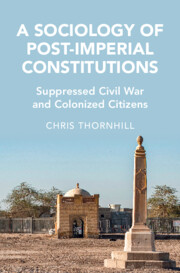Book contents
- A Sociology of Post-Imperial Constitutions
- Cambridge Studies in Law and Society
- A Sociology of Post-Imperial Constitutions
- Copyright page
- Dedication
- Contents
- Acknowledgements
- Introduction
- Chapter One Imperialism and the Origins of Constitutions
- Chapter Two Constitutions and the Persistence of Empires
- Chapter Three Imperialism and Global Civil War
- Chapter Four Imperial Nations in Latin America
- Chapter Five Military Constitutions in and after the Ottoman Empire
- Chapter Six World Law and Occupation Constitutions
- Chapter Seven The Occupation Constitution II
- Chapter Eight The Occupation Constitution III
- Chapter Nine Constitutions after War
- Chapter Ten New Security Constitutions
- Conclusion
- Bibliography
- Index
- Cambridge Studies in Law and Society
Conclusion
Published online by Cambridge University Press: 06 December 2024
- A Sociology of Post-Imperial Constitutions
- Cambridge Studies in Law and Society
- A Sociology of Post-Imperial Constitutions
- Copyright page
- Dedication
- Contents
- Acknowledgements
- Introduction
- Chapter One Imperialism and the Origins of Constitutions
- Chapter Two Constitutions and the Persistence of Empires
- Chapter Three Imperialism and Global Civil War
- Chapter Four Imperial Nations in Latin America
- Chapter Five Military Constitutions in and after the Ottoman Empire
- Chapter Six World Law and Occupation Constitutions
- Chapter Seven The Occupation Constitution II
- Chapter Eight The Occupation Constitution III
- Chapter Nine Constitutions after War
- Chapter Ten New Security Constitutions
- Conclusion
- Bibliography
- Index
- Cambridge Studies in Law and Society
Summary
This book has sought to illustrate how, through its history, constitutional law has developed in complex conjunction with imperialism. From the beginning, constitutional law took shape as an internal organizational structure that allowed states to adapt their functions to the pressures of an international society increasingly defined by imperialism, and it formed a mechanism for creating governmental legitimacy that was strongly connected to military necessities. This character of constitutional law originated in the intensification of imperialism after circa 1750, when national governments were forced to increase domestic military support for their actions. To achieve this, governments established immediate individual linkages with their subjects and conducted processes of vertical integration in their societies, which reduced the social importance of local and religious bodies. These processes were usually consolidated by constitutional order: constitutions served both to organize the vertical integration of society and to soften or at least control the lateral conflicts that such integration engendered.
- Type
- Chapter
- Information
- A Sociology of Post-Imperial ConstitutionsSuppressed Civil War and Colonized Citizens, pp. 502 - 506Publisher: Cambridge University PressPrint publication year: 2024

